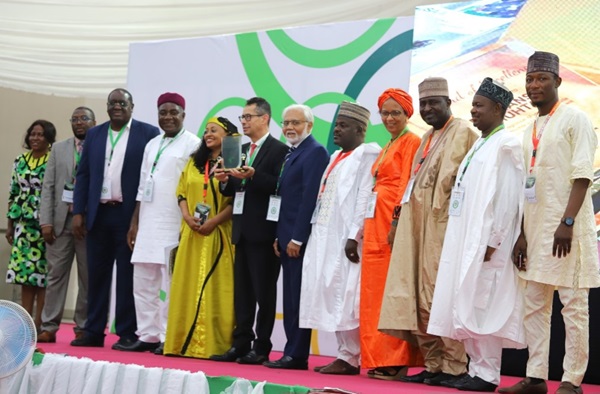
The Kano State Agro-pastoral Development Project (KSADP) has revealed that over 450,000 smallholder farmers in the state are set to experience significant improvements in crop yield and livestock productivity.
This initiative is part of a collaborative effort between the state government, the Islamic Development Bank (IsDB) and Sasakawa Africa Association, with a project investment of $19million.
In a communique issued after a high-level workshop organised by the Sasakawa Africa Association, the Islamic Development Bank (IsDB) and the Kano State government, the project partners commended the impressive progress of KSADP. The workshop highlighted the project’s role in empowering smallholder farmers through the provision of knowledge, skills, production tools, and inputs, which have directly contributed to increased productivity and improved livelihoods for beneficiaries.
The workshop, titled “Agricultural Transformation and What Works: Reflections from the Crop Value Chain of the Kano State Agropastoral Development Project (KSADP),” was organised to showcase the project’s achievements, exchange knowledge, and share best practices with stakeholders from across Africa. The event also sought to encourage other state governments and countries to access IsDB funding for agricultural development. The meeting provided a platform for exploring partnerships and funding opportunities to ensure sustainable agricultural development across the continent.
Participants at the workshop acknowledged agriculture’s pivotal role in Africa’s development, noting that it employs over 70 per cent of people in rural areas. They emphasized the need for increased investment in the agricultural sector to drive growth and prosperity. The session also spotlighted Kano State’s commitment to agricultural transformation and how the KSADP’s model can be scaled up across Nigeria and other African countries.
The communique also addressed some of the key challenges facing agriculture, including the impacts of climate change on smallholder farmers. The participants called for the adoption of climate-resilient crops and technologies to mitigate the adverse effects of climate change. Another important issue discussed was the lack of access to credit for smallholder farmers. To address this, the meeting recommended the development of innovative financing models such as microcredit schemes and agricultural insurance to bolster farmers’ financial resilience.
The private sector was also urged to take a more active role in driving agricultural innovation and investment, particularly in input supply, mechanisation and market development. Participants agreed to leverage the funding opportunities available through the Islamic Development Bank (IsDB) and emphasised the importance of sustained partnerships to support additional states and countries in accessing these funding windows.
The high-level seminar was chaired by former Nigerian president, Olusegun Obasanjo, represented by Vitalis Ortese. There were over 235 participants in attendance, including the governor of Kano State, Engr. Abba Kabir Yusuf – who was represented by the deputy governor, Aminu Gwarzo – as well as the governors of Gombe, Jigawa and Benue, represented by their agriculture commissioners. Other notable attendees included members of the Nigeria Governors’ Forum and the Kano State Commissioner for Agriculture.
The Kano State Agro-pastoral Development Project (KSADP) is a five-year initiative funded by the IsDB, the Lives and Livelihood Funds (LLF) and the Kano State government. The project is being implemented by Sasakawa Africa Association, with the goal of reaching 450,000 smallholder farmers. It aims to enhance crop and livestock production, reduce poverty and improve food and nutrition security in Kano State by developing agro-pastoral production systems, including production, processing and retailing.
As the project moves forward, stakeholders are optimistic that KSADP will continue to drive agricultural transformation in Kano State and serve as a model for other regions in Nigeria and Africa.

